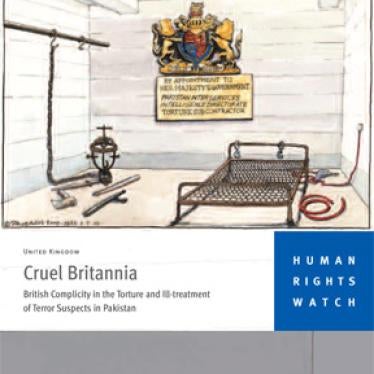ON July 6, in an effort to restore the tarnished reputation of MI5 and MI6, British Prime Minister David Cameron announced a judicial inquiry into Britain's role in torture and rendition since September 2001. Cameron admitted in a speech to the House of Commons that "the reputation of our security services has been overshadowed" by allegations about complicity in torture.
"The longer these questions remain unanswered, the bigger the stain on our reputation as a country that believes in freedom, fairness and human rights grows," Cameron told the Commons. That day the British government also published rewritten guidance for intelligence and military personnel clarifying they must never take any action where they know or believe torture will occur.
This is not a discussion far removed from Pakistan - after all, many of the cases in question in Britain involve allegations of mistreatment and torture committed in this country with British involvement.
Salahuddin Amin is a British citizen convicted by a UK court in 2007 for plotting attacks against several targets, including London's Ministry of Sound nightclub. Amin says that while in Pakistani custody he was met by British intelligence officials on almost a dozen occasions between sessions of torture.
Zeeshan Siddiqui, another British citizen, was detained in Pakistan in 2005 and allegedly tortured by intelligence agencies while being interrogated over his alleged membership of Al Qaeda. He reports being beaten, chained, injected with drugs and threatened with sexual abuse. British intelligence officials, who he says visited him, must have known from visible injuries that he had been mistreated.
Rangzieb Ahmed, from Rochdale, says he was beaten with sticks, whipped with electric cables and deprived of sleep. Over a three-day period, he says, his fingernails were pulled out as intelligence officials interrogated him. He was convicted in the UK of being an Al Qaeda member and of directing terrorism. Crucially, at his trial the British government did not deny defence claims that MI5 sent the ISI questions to put to Ahmed during interrogation, and that MI5 questioned him while he was in ISI custody.
All the cases mentioned above were documented in last year's Human Rights Watch report, Cruel Britannia: British Complicity in the Torture and Ill-treatment of Terror Suspects in Pakistan. As the lead researcher in a year-long investigation in Pakistan, the UK and the United States, I testified in February 2009 to the British parliament's Joint Committee on Human Rights. In our testimony before the committee, and subsequently, Human Rights Watch called for an independent inquiry into these allegations as well as publication of the guidelines that govern the conduct of British security personnel in counter-terrorism operations overseas.
The new British government's decision to conduct an inquiry and publish the guidelines will, hopefully, mark a new beginning for Britain, which had seen its moral authority as a global human rights champion suffer tremendously as a result of these allegations.
It is crucial that the Cameron government show greater compliance with the law than did its predecessor. In recent years, the actions of British officials in the pursuit of their counter-terrorism objectives have violated Britain's obligations under international law and require that those responsible be held accountable. The Convention against Torture prohibits torture and other ill-treatment, and complicity in such acts by state officials and agents. The European Convention on Human Rights, which is incorporated into law by the UK Human Rights Act 1998, similarly prohibits torture.
Of course, it always beggared belief that the UK government was unaware of the systematic use of torture in Pakistan as many officials claimed. In fact British officials engaged in acts that virtually required that they knew about the use of torture in these cases. The victims have described meeting British officials while detained in Pakistan. In some cases this happened shortly after sessions in which the individuals had been tortured, when it was likely that clear and visible signs of torture were present.
British officials supplied questions and lines of enquiry to Pakistan intelligence sources in cases in which detainees were tortured. Britain was also putting pressure on Pakistani authorities for results. In this environment, passing questions and offering other cooperation in such cases without ensuring that the detainees were treated appropriately was an invitation, if not encouragement, to abuse. Human Rights Watch has always made clear that there was no evidence available of UK officials directly participating in torture. Yet British complicity is clear.
But of course primary responsibility for the use of torture against these individuals lies with the Pakistani authorities. Pakistani officials have insisted that they acted under immense pressure from the UK and the United States to "perform" in the "war on terror". But as the British security services are learning, "pressure" is no excuse for illegal and abusive behaviour.
And Pakistan's security services need to take heed. Torture is a heinous crime that is covered by universal jurisdiction. If charges are brought against anyone in the UK on the basis of the process that is under way, it will only be a matter of time until such charges are brought against the Pakistani security personnel involved.
The security relationship between Pakistan and the UK remains close. Pakistan needs to end the widespread use of torture by its intelligence and law-enforcement agencies, period. And Pakistanis would only gain the respect of the world if their government and military tell Britain, the US and other players in the fight against the Taliban and Al Qaeda that they will not engage in abusive practices at their behest or under pressure from them. This will not only ensure compliance with Pakistan's domestic and international legal obligations, it will help the country become a more humane society - a country that, with an elected government, rules by law and not by the fist.
Ali Dayan Hasan is a senior researcher in the Asia Division of Human Rights Watch.







